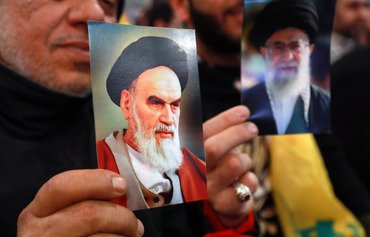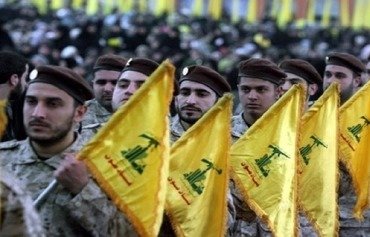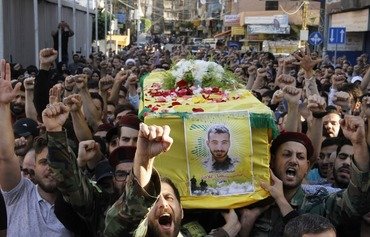Despite public statements by Hizbullah leader Hassan Nasrallah that the militia has remained unscathed from tightening US sanctions, there are many indicators that the militia is suffering under financial strain, experts say.
The pressure on Hizbullah's finances is steadily increasing, with the latest sanctions imposed last month by the US and six Gulf nations on 25 individuals and entities associated with the militia and Iran's Islamic Revolutionary Guard Corps (IRGC).
In a November 11th speech, Nasrallah declared that the sanctions "have had an impact on the Lebanese economy, the Lebanese financial situation and banks... but they do not put pressure on the [militia]".
"Our money is not in the banks," he said, adding that everyone knows who funds the militia, in reference to the Iranian regime and IRGC.
Hizbullah's talk of not being affected by the sanctions because its money is not in Lebanese banks "smacks of false arrogance because its members and supporters have funds and bank accounts", political sociology professor Mona al-Basha said.
They were adversely impacted from the closure of a local bank on account of suspect movement of funds linked to the militia, she told Al-Mashareq.
"They obviously no longer have the freedom to transfer money and are affected by the country's economic situation, therefore any restrictions placed on banks will limit their freedom of movement," she said.
Cutting back expenditures
The protests taking place in Lebanon today "have broken the barrier of fear among the masses, which, along with the sanctions, will sooner or later have an impact on the party's role inside and outside Lebanon", al-Basha said.
"[Hizbullah] must take into account that its activities in Syria, Iraq or Yemen are outside its environment, and there is no telling when this will turn against it," she said.
Hizbullah had been receiving hundreds of millions of dollars from the IRGC, but has been forced to cut back expenditures as the IRGC suffers a loss in revenue.
"Some international reports indicate that the monthly wages of Hizbullah fighters have been halved from a high of $1,500," said economist Violette Ghazal al-Balaa.
The drying up of Hizbullah's financial channels has prevented the easy flow of money to it from Iran, which the militia used to pay its fighters in Syria and Lebanon, she said.
Curbing Tehran's support to militias
The sanctions imposed on the Iranian regime "are a consequence of its aggressive policies and efforts to undermine peace and stability in the region", said political sciences expert and retired military Abdul-Mohsen al-Shammari.
"This portends a nightmare for the regime, which has turned its attention from serving its people to pursuing costly external agendas while ignoring the concerns of its citizens," he told Al-Mashareq.
"The effects of the international sanctions are becoming evident from the decline in Tehran's support to its affiliates in the region, and the widening circle of these affected groups," said al-Shammari.
He pointed to "the significant reduction in the budget of the Iranian Ministry of Intelligence, which is the main source of funding for proxy groups in Yemen, Iraq and Lebanon".
Moreover, a number of banks in the region that previously sympathised with the Iranian regime have now stopped co-operating with it and with its affiliates out of fear of sanctions, he said.
Iran's support for Hizbullah, the Houthis in Yemen and Iraqi militias -- such as the Badr Organisation, Kataib Hizbullah and Asaib Ahl al-Haq -- has begun to collapse, al-Shammari said.
This has been evident in Lebanon from Hizbullah's latest campaigns soliciting donations from its supporters.
"This clearly sums up the reality of the situation and its political effects," al-Shammari said.

![Fighters from Lebanon's Hizbullah take part in a military parade marking Martyrs' Day in the southern town of Ghazieh, south of the port city of Sidon, on November 12th. [Mahmoud Zayyat/AFP]](/cnmi_am/images/2019/11/21/21000-Lebanon-Sidon-Hizbullah-600_384.jpg)







These analyses have nothing to do with reality and are completely unfounded. In fact, these are the hopes of your website. I don't mean to defend anyone here, but reality says so. For a long time now, you've been publishing the same stories, but the result, as you and others can see, is that more success is being made and more power is being obtained. Either you lie or don't know or deceive readers.
Reply3 Comment(s)
The war of glasses is a total failure. Everything that you published in this report has nothing to do with reality.
Reply3 Comment(s)
Al-Sayyid Nasrallah confirmed that despite these sanctions, and any possible subsequent sanctions, the party is the only entity that would continue to pay salaries, even if the Lebanese state stopped that. However, he didn’t deny that these sanctions affected the Lebanese society as a whole and not only the party’s supporters. Therefore, we hope that you’ll abide by showing the truth in the topics that are published even if you have political, ideological or psychological disputes with others.
Reply3 Comment(s)